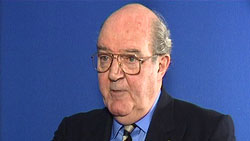 |
| Major General Mike Reynolds |
And then it became a war rather like the First World War, we were in trenches, we didn’t move forward or back, we only moved sideways or into reserve for a couple of weeks or something like that. But even then, we were still within shell and mortar range. And it was very boring, 95 per cent boredom and the other 5 per cent you were terrified. We did a lot of patrolling towards the Chinese to find out what was going on, to ambush patrols, try and capture prisoners. You were going in and out through minefields and when you were on these patrols it was very frightening, there’s no doubt about that. Soldiers hated it and the officers did as well.
My platoon ran into most of a Chinese company that were trying to advance up the side of a hill, and we were just getting into an ambush position and there was a very short, sharp firefight with lots of grenades being thrown. And I got part of, presumably, a Chinese grenade down my side, might have been a British one for all I know, and two bullets from a [?Bren] gun, a small machine gun, in my right leg, which smashed it. And I was actually out there for 9 hours before [being rescued] and most of my platoon, one man was killed, one was captured and the rest of us were wounded. And some of them managed to get back and then eventually after 9 hours, rescue parties came out and they managed to get us back on a misty, foggy morning. We were actually mortared on the way back and the chaps who were carrying [my] stretcher dropped it to take cover and I rolled down a bank, which probably did me more harm that the initial bullets had. Anyway, I was then lifted out by helicopter, went back to a MASH, as in the television series, and there they took a couple of bullets out of my leg which had lodged there. And I can vaguely remember a hand coming out and these two small bullets and the chap saying “We’ve taken these out of you”. And then back to an Evacuation Hospital in Seoul, American again, and then flown out from there to a British Military Hospital in Japan.